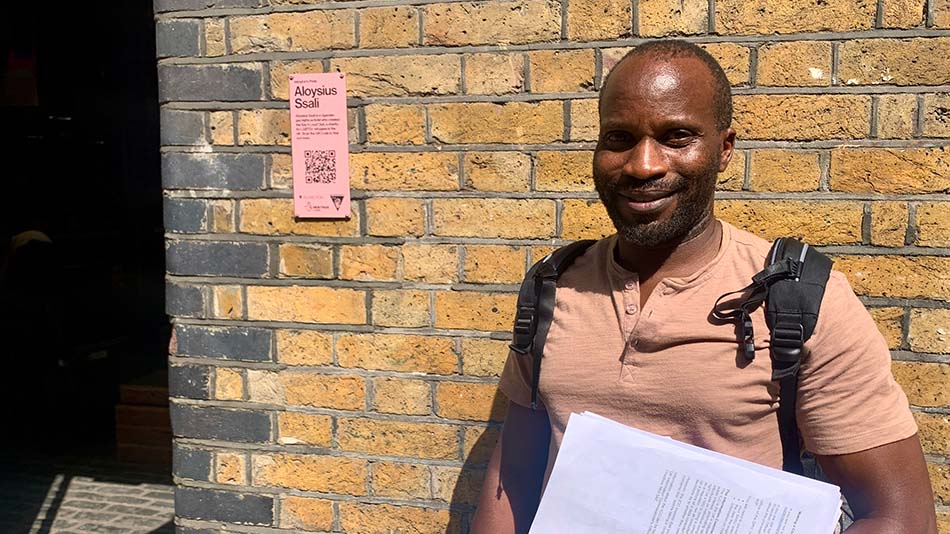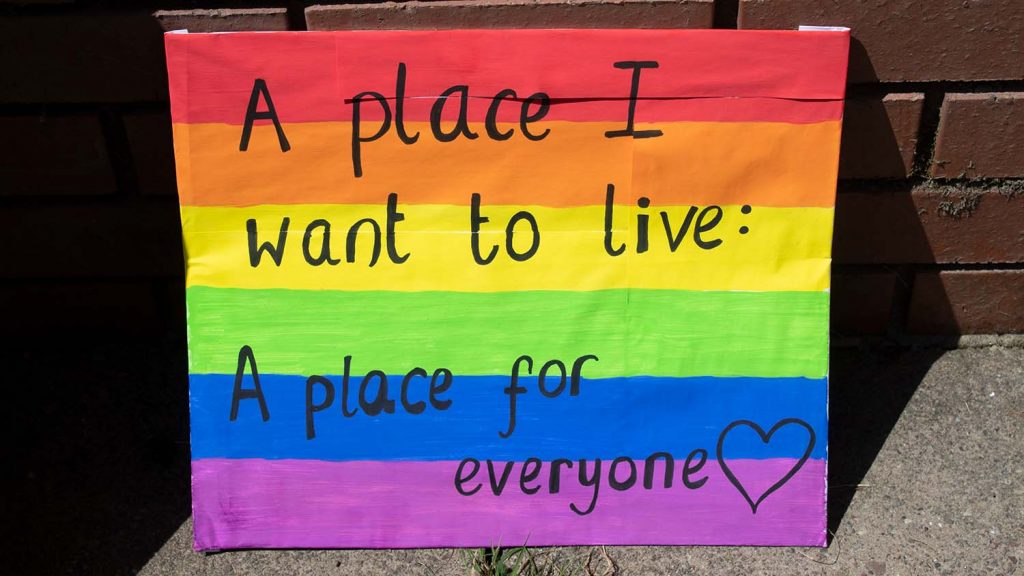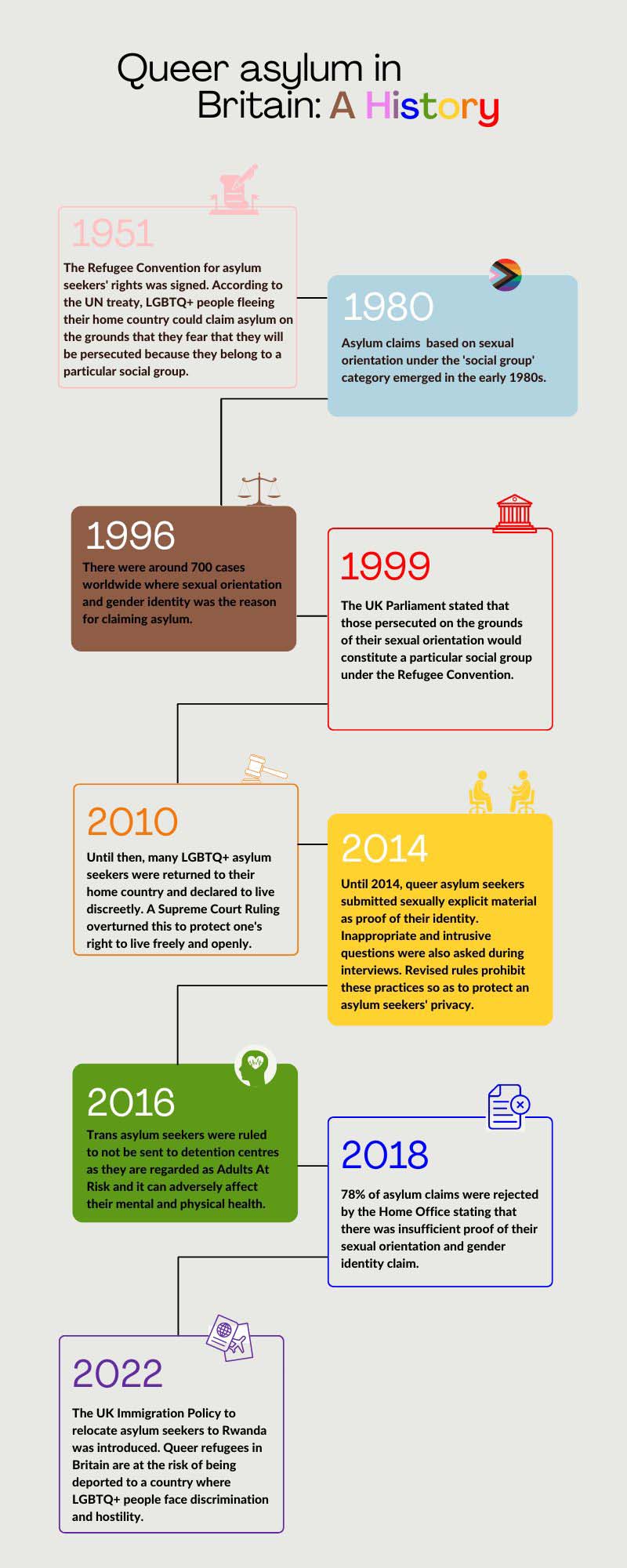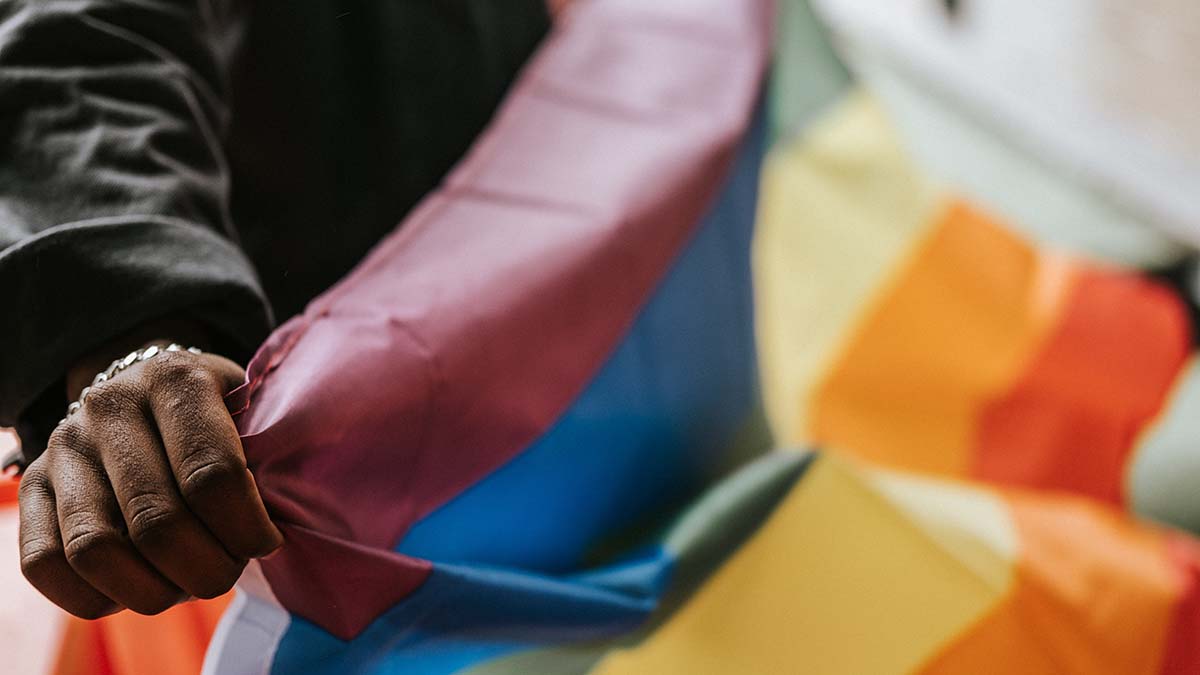Problems for queer refugees do not end once they have been granted sanctuary in Britain. They face mental health challenges and the financial burden that come with the unfavourable environment for migrants in the country.
Aloysius knew that it was no longer safe for him to stay in Uganda. His friends had been arrested and tormented. But it was the day that he was walking down the streets of his city, when he was grabbed by the collar by a group of homophobic men, who then attacked him, that he realised that it was too dangerous for him to stay in his country anymore.
As a gay man living in a country that outlaws homosexuality, he was forced to leave. But not before being imprisoned.
“I got arrested, I was detained, I was tortured,” says Aloysius Ssali, who was jailed for setting up Say It Loud Club, a support group for queer Ugandans who struggled with isolation because they were forced to hide their sexual identity, as in Uganda, same-sex relations are criminalised.
“When I was in college, I suffered loneliness. In Uganda, there wasn’t an LGBTQ+ community, and this is what I was trying to create. It was supposed to be an underground movement,” says Aloysius. “Registration was also through secrecy. Someone had to know someone to come in… But things went horribly wrong. Some of my friends got arrested and some of them, I never saw again.”
After escaping prison, Aloysius fled to the UK in 2005. But for five years, he was unaware that he could claim asylum in the UK. During the time, he barely scraped a living and was forced into homeless while battling isolation.
When he boarded a bus in London where he picked up the newspaper laying on the seat, one of the headlines that caught his attention was of a Home Office decision to deport two gay men that had been overturned by the Supreme Court. This was when he realised that he could claim asylum in Britain.
“I saw that, and that’s what inspired me to eventually seek asylum. By doing so, I became one of the first few people in the UK to successfully apply for asylum on the grounds of sexuality,” says Aloysius.
However, the asylum process turned out to be nerve-wracking and did not bring him any solace.
“It took me all that time, wandering, living on the streets, being homeless, struggling with mental health issues, and then when I went into asylum, the reception I received, also shocked me,” he says.

Coming to Britain did not alleviate the pressure of being compelled to conceal his identity. “I wasn’t able to open up because of the long-term concealment, and I was in a new country. If you have concealed your identity for a long time, it also brings other impacts,” says Aloysius, who struggled with his mental health. “You are always living in fear…The fear of the authorities. Because for me back home, the people in the uniforms, they represent fear. So, when I came to the UK, I was scared to even see a police officer. Even for me to think of officials in immigration, it was about fear.”
Like Aloysius, many queer asylum seekers feel coerced to hide their sexual and gender identity, according to a study by Stonewall.
Sathi, a gay, Sri Lankan asylum seeker told Stonewall, “Until I got released, I never ever told anyone. I have to make sure that I am not exposing my sexuality when I am speaking with my partner.”
Faith can also play a significant role in the way they express their identity, according to Khakan Qureshi, former Stonewall LGBT Diversity Role Model and founder of Birmingham South Asians LGBT.
As he has worked with queer Muslim asylum seekers in the UK to help reconcile faith with their sexual orientation, he says, “It’s still a long-drawn process because they are fearful, and there’s a lot of psychological trauma because you can’t ask somebody to cut off something that they’ve learnt all their life.”

Moreover, some of them find it hard to seek help from religious charities. Layla, a lesbian refugee from Syria said that she felt the need to hide her sexual identity when she visited the Church that was supporting her through asylum, because she feared that she would be discriminated against, according to a study in the journal Ethnic and Racial Studies.
Another great challenge that LGBTQ+ asylum seekers face is homelessness. As the Home Office demands proof of one’s sexual and gender identity to grant them asylum, many face rejections as they are unable to provide evidence as many had to flee their country overnight as they were at the risk of being persecuted, and are left to fend for themselves.
Nearly 83% of LGBTQ+ asylum seekers are left destitute as a result of rejections from the Home Office coupled with homophobic attacks faced at government-arranged accommodations.
Usmann, a queer refugee, whose ordeal wasn’t over when he escaped oppression after fleeing Pakistan, was sleeping on a friend’s sofa, because the accommodation provided to him by the Home Office was not safe for LGBTQ+ people, according to a report by Vice.
For queer women like Daphine, who experienced sexual violence in Uganda, she was hesitant to apply for asylum, fearing deportation. She told Vice that she had to spend nights at friends’ homes in Britain before she could approach the Home Office and make her claim.
With homelessness on the rise, asylum seekers not being allowed to work while receiving a meagre £40 a week for survival, affirms that UK fosters a hostile environment for migrants. The recent Rwanda policy has been criticised for being perilous, particularly for LGBTQ+ people seeking asylum, as the country does not protect the rights of LGBTQ+ individuals.
Aloysius believes that the risk of sending queer asylum seekers to Rwanda is immense. He feels that the Home Office does not engage with LGBTQ+ refugee communities, which has led to this policy coming to effect. “The Home Office is also part of the community, but they behave as though they are outside of the community,” he says.
He feels that the government does not do enough to ensure the mental wellbeing of queer asylum seekers. Back when he was claiming asylum in 2010, there weren’t any organisations that were willing to help him when he was struggling with isolation.
“When I was in the system, I tried a lot of organisations. Very well-known organisations. Big names. Big budgets. Big offices. They’d give you a cup of tea but the moment you mention ‘I am a gay man; from Uganda’, they would just tell you, ‘Oh, maybe you need to see a solicitor’,” he says. “Noone was there to engage with you; There was a total absence of understanding.”
People are scared of refugees because of the propaganda. Some of the politicians are very hostile.
Aloysius Ssali, queer refugee and activist
The impact that the asylum process leaves on queer refugees while they grapple with past trauma, is extensive. Aloysius was abandoned by support groups that he thought would guide him.
“There was no kindness. But what made it worse, I made phone calls to different organisations. I was crying out for help because I was scared. None of them replied. None of them ever sent me an email,” he says.
For queer asylum seekers, their mental health concerns go unaddressed because of a lack of signposting towards organisations that support LGBTQ+ people of ethnic minorities. But it doesn’t get much better once they’ve been granted asylum, especially as they struggle to find work to sustain themselves.
When he was granted asylum, Aloysius was denied work as he was looked down for being a refugee.
“I used to apply for jobs but the moment you produce your ID, people begin to wonder: Why are you a refugee? People are scared of refugees because of the propaganda. Some of the politicians are very hostile,” says Aloysius. “So, if you are a refugee, it’s like they have put a mark on you, that you are not a good person and that is a problem.”
He says that access to the labour market is a problem for any refugee but is amplified when you belong to the LGBTQ+ community, as many refrain from seeking help from diaspora refugee communities because they believe that they could be faced with discrimination based on their sexual and gender identity.
Aloysius’ struggle to find work back then, remains a reality even today. Like many queer refugees in Britain, Azi*, who is currently on the UK benefits scheme, says that his mental wellbeing was severely affected when he was financially exploited. Dispirited that the system doesn’t do much to protect the rights of refugees in the country, Azi feels like he is stuck in limbo after he had to quit his job as a security guard when he faced racism at the workplace and from customers.
“I went through that. I just held it in me. The issue is that I’ve been holding, holding it in for so long and so I said before I commit any crime, I quit. As a black man, people will have prejudice against you,” says Azi.
Many queer refugees who were high achievers academically back in their native country, have to start from scratch because Britain does not recognise their educational and professional qualifications, according to Khakan Qureshi.
“It’s only a few who are able to finance themselves, some might even work cash in hand. Some unfortunately, do slip through the nets and they end up on benefits, long-term. Again, that would feed into their self-esteem and their self-worth,” says Khakan.
As many refugees struggle to secure a job, Numair Masud, a queer refugee and activist in Wales, says that by denying work to those who have transferrable skills, you are potentially depriving the economy.
He also believes that if the Welsh government considers itself to be inclusive, then offering training opportunities for asylum seekers and refugees will be a two-way benefit.
While struggling to finance themselves, integrating and finding a community, can also be rather difficult for many queer refugees.
“Integration is challenging even if you are born and bred in a country… And then if you add to that, the fact that you are someone claiming asylum, someone who is LGBTQ+, you’re a sexual minority and an ethnic minority, those challenges are amplified,” says Numair.

“You would want them to be well integrated and part of that process is to make sure that they are aware of what resources are available. I think that is really important and that’s something that is lacking,” he says.
Like Numair, Aloysius also thinks that integration is a key concern for queer refugees.
Having lived in another country his whole life, accustomed to the cultures and traditions that come with the place, adapting to the norms of a new society felt strange and intimidating, which is why he decided to set up a support group for LGBTQ+ refugees to address problems and socialise, after being granted sanctuary in the UK.
“I wanted to create a community that could go out there and look out for people who are in detention centres who identify as LGBTQ+,” he says.
The London-based organisation, which he named Say It Loud Club, a means to revive the spirit of his old club back in Uganda, aims to help LGBTQ+ asylum seekers access mental health services and get the support that they need through the often-disheartening asylum-seeking process.
“Mental health is a big thing for refugees and asylum seekers in general. But it is worse for those who identify as LGBTQ+ people because they come here, and they find it difficult to engage with people who come from their home countries who come with their attitudes towards LGBTQ+ people. Therefore, people end up feeling lonely,” says Aloysius. “They end up feeling isolated. So, we try to bring in different activities every time to engage with people and help with mental health healing.”
Despite working to create a support system for them, Aloysius believes that the government’s indifference towards queer asylum seekers and refugees makes it harder for them to integrate. He urges the government to listen.
“We are the children of the UK asylum system. We love the asylum system; we want to make it work… We know who needs help. We know people who are struggling because of the poor asylum system,” he says. “The Home Office needs to reach out to communities like ours because the Home Office is also part of the community.”
(Names of the people marked with an asterisk* have been changed to protect their identity.)

